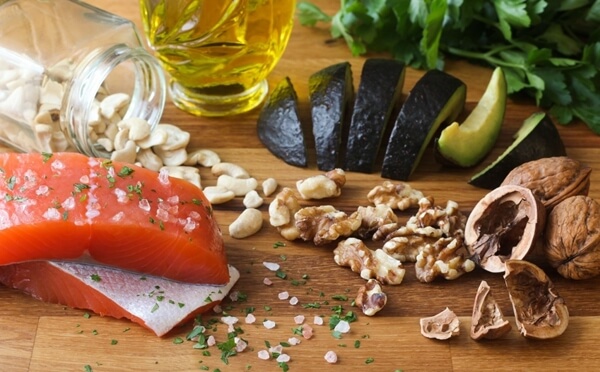People who have tried to quit an addiction know how hellish the experience can be. Not only do you go through terrible withdrawal symptoms, you also have to contend with cravings for the substance you are trying to quit.
What you may not know is that food can be a useful weapon to help you in your fight against relapsing into addiction. Let me tell you the how and what of food’s role in addiction recovery.
Why Having a Good Diet in the Time of Withdrawal is Wise

When trying to quit an addiction, one experiences withdrawal symptoms. Withdrawal is a process by which the body detoxifies itself, trying to return to normal functionality after the drugs leave the system. That’s why it’s called “detox”.
Withdrawal symptoms can be excruciating. For instance, opiate withdrawal puts you through anxiety, insomnia, shaking, chills, nausea, and diarrhea. The best thing to do when detoxing from opiates is go to a professional detox facility. They can help make the process more manageable.
Alcohol withdrawal is also terrible. It’s one of the most dangerous withdrawals you can go through. It can lead to fatal seizures. To prevent some of these life-threatening side effects, you may be given valium for alcohol withdrawal.
While going through these horrors, what you eat can be instrumental in helping you feel better or get better. Good diet can help you cope better with the withdrawal symptoms.
Good nutrition aids in the physical healing of the body by providing the nutrients required to create a healthy environment for managing withdrawal symptoms.
The drug detox process goes beyond merely quitting an addiction. It’s also about replacing bad habits with good ones. For instance, the U.S. National Library of Medicine observes that a recovering drug addict has a higher likelihood of relapsing when they have poor eating habits.
Another reason for eating healthy is that people with a drug addiction often disregard what they eat. Due to their addiction, their ability to get organized and do things is impaired. They may go for days without eating because of lacking the will to buy or cook, or they forget to eat.
They may, therefore, be in bad nutritional shape, which means their body may not be strong enough to handle the withdrawal symptoms. Eating healthy helps make the body stronger.
Hunger is one of the things that can cause a relapse. A poplar acronym in addiction recovery circles is HALT. It stands for Hungry, Angry, Lonely, Tired – the four states you should avoid because they can cause you to relapse.
Nutrition Wisdom for the Recovering Addict
- Consider Your Liver

The liver is the main organ in your body that does the detoxifying, and is important for your brain and central nervous system to function well. It is, therefore, very important that your liver be in good health.
When the liver is not functioning well, you can have headaches, allergies, bad breath, skin problems, fatigue, and weight gain.
Sometimes substance abuse may cause irreversible damage to your liver. Many times, though, it’s possible to reverse the damage by maintaining sobriety and eating foods that will help repair the damage.
Sulfur-rich foods help detoxify your liver. Antioxidant-rich foods help in healing the liver.
Examples of detoxifiers include onions, garlic, broccoli, Brussels sprouts, cauliflower, cabbage, beetroot and lemon. They help remove any buildup created by the addiction.
Examples of antioxidant include berries, oranges, apples, cantaloupe, raisins, prunes, plums, pink grapefruit, and pears.
Cut down on the saturated fats and processed foods. They can be hard on the liver, overworking it when it’s trying to rid your body of toxins. Eat a balanced diet rich in fiber. Rather than processed foods, eat basic foods like vegetables.
Where possible, eat organic produce and animal products. This will help reduce the toxic overload your liver has to handle.
Eat a lot of fruits and vegetables – make tasty salads to spice things up and get you motivated to eat healthy.
Eat a lot of plant proteins (from peas, lentils, beans and legumes). Animal protein is also good. The body uses protein to repair tissues and cells and restore organs.
Good foods for your liver include cabbage, broccoli, kale, Brussels sprouts, parsley, artichoke, green leaf vegetables, cilantro, and watercress. You should also eat healthy fats from wild cold water fish like herring, sardines, and salmon. Other foods good for your liver are flaxseed, extra virgin olive oil, nuts, and seeds.
You should also drink a lot of filtered water for proper hydration of your body, and to help support your liver and kidney as they remove toxins from the body. White and green tea are also good.
- Hydrate

Alcohol dehydrates your body, but your body needs water for proper functioning. When using, many drug users feel no inclination to drink water, and may go for long periods without hydrating with water. Drinking lots of water during detox is critical for a successful recovery. Water flushes the body, removing toxins from organs like the kidneys. Don’t wait to feel thirsty.
- Avoid Caffeine
Don’t take caffeinated drinks like coffee and energy drinks when you are detoxing. One of the withdrawal symptoms of alcohol is shaking. Caffeinated drinks may cause your shaking to worsen and stimulate tremors.
Best Foods for a Recovering Addict

- Protein – 46 grams of protein for women and 56 grams for men are the recommended daily amount of protein you must eat. Protein helps build the body.
- Whole-grain carbohydrates instead of refined foods like white bread. Whole grains contain fiber, which means you will have fewer digestion issues.
- Fruits and vegetables because they are rich in fiber.
- Healthy fats contained in foods like fish, avocados, nuts, and certain oils. Omega-3 is an essential fatty acid mostly found in fish and seafood, and it helps keep cravings down. Omega-3 also reduces the feelings of depression that may plague a person in addiction recovery.
- Seaweed, if you can get it, because it contains sodium alginate. Sodium alginate binds to the remnants of drugs in your body and prevents them from being absorbed in the body.
- Ginger tea because it contains gingerol. Gingerol makes you sweat. In the process, the remnants of drugs are sweated out of your body.
Final Thoughts
When it comes to health, the basics are always relevant. For instance, when recovering from an addiction, the basic good habits you already know are what will help you: a good diet, exercise, drinking lots of water, and eating regularly. Eating well is like putting on armor for war – a strong body ready to combat addiction and come out on the other side victorious.




I need this… hahahaha